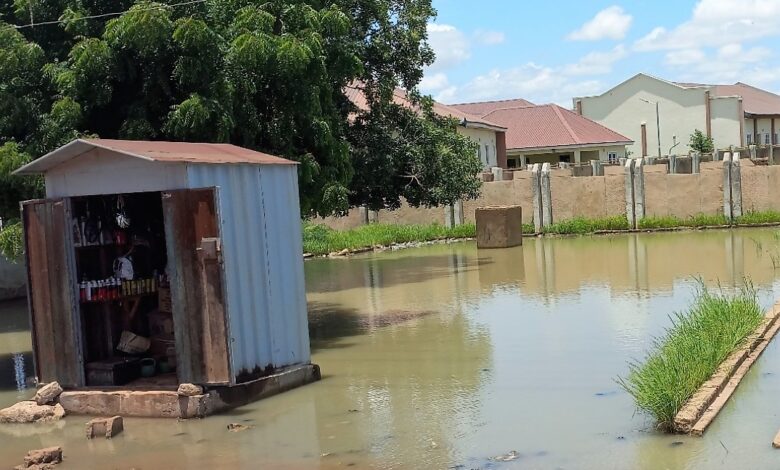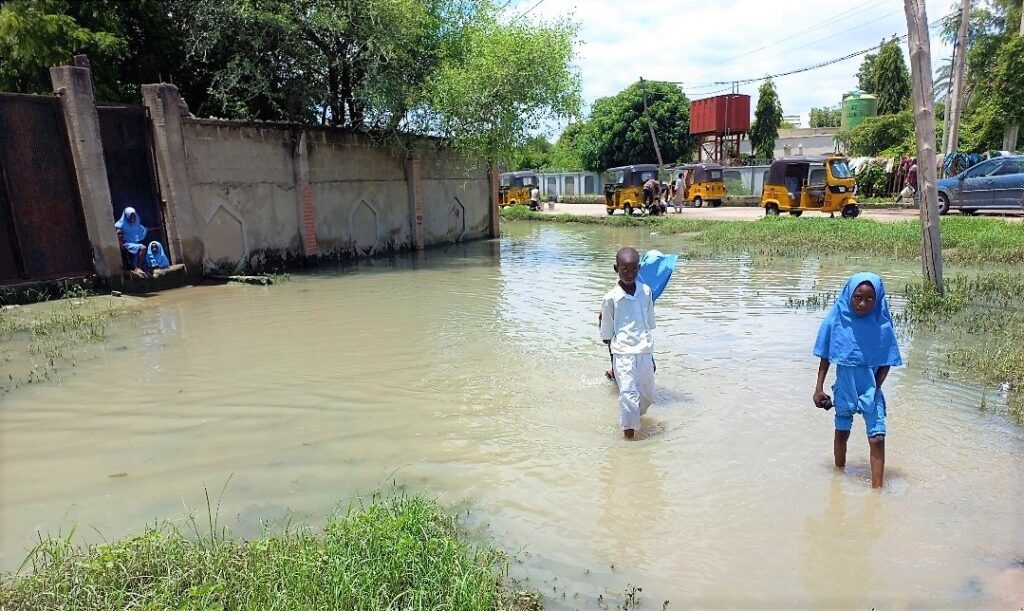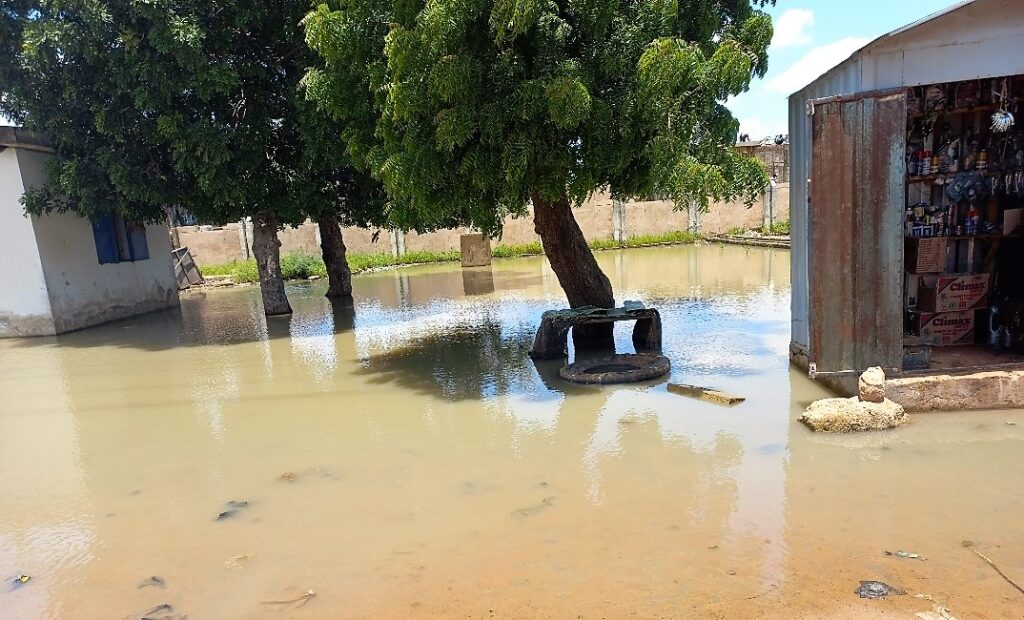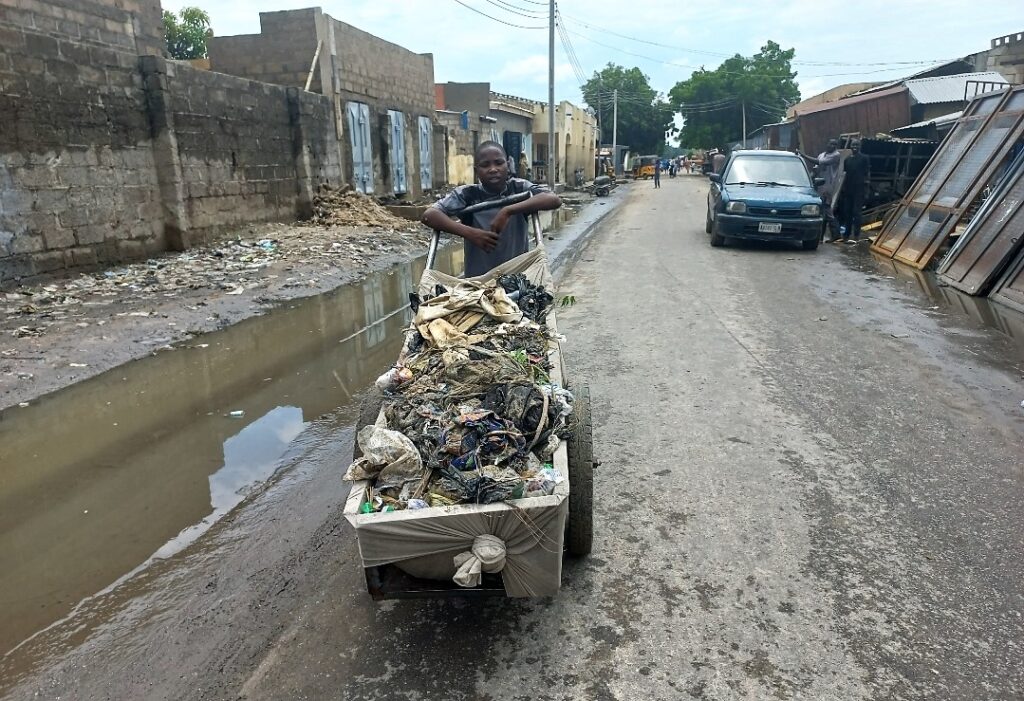Maiduguri Flood Puts Displaced Residents At Risk Of Waterborne Epidemic
Hundreds of houses are submerged in filthy water after heavy rainfall in Bulumkutu, a crowded neighbourhood in Maiduguri, Northeast Nigeria.

Days of torrential downpour have forced many residents in Maiduguri, northeastern Nigeria, to temporarily evacuate from their flooded homes. Badly designed and obstructed drainages, a bold signature of years of poor town planning, has left many in perpetual misery every time it rains. For this reason, neighbourhoods like Ngomari, Bulumkutu, and Polo general area are common sights of flooded homes and streets each time it rains heavily.
HumAngle learnt that the biggest suffering of the residents is not even the flood-induced displacement but the unavoidable health risks associated with the natural disaster.
“When rain falls for more than two hours, everywhere in this neighbourhood becomes flooded. Our homes are submerged in water and the contents of the toilets and latrines,” said Nura Garba, a resident of Bulunkutu Layin Jirgi.
Though the government had constructed drainages on either side of the road that crisscrossed the neighbourhood of Ngomari, they hardly convey the water because they are clogged.

Seated in the centre of Ngomari is a large and deep pool of water popularly called Kogin Tipper. Residents said the pool has been a water dump for most of the surrounding neighbourhoods
“I have lived in this neighbourhood of Bulunkutu for over 20 years now, and I have participated in the burial of many children who were drowned in that pool of water while going to school or running errands for their parents,” said Adamu Garba, another resident.
Salamatu Mohammed, who lives in Ngomari said the flood not only renders them homeless during the rainy season, but “it also leaves us with concerns for our health.”
“Every rainy season, the flood used to wash over graves and pop up corpses in the neighbourhood cemetery, and this worries us a lot,” she said.
“We want the government to have mercy and come to our assistance. This is becoming unbearable. Our homes and means of livelihood are destroyed every year due to flooding.”

HumAngle observed how some major streets like those along the Polo road were constructed without the requisite drainage. Hence the roads become flooded each time the city experiences a downpour. Streets with recently constructed roads and twin drainage within the elite neighbourhood of Polo are currently filled with water as the blocked drainages continue to dam up.
Along Damboa road, business premises remain submerged in stagnant water as owners lament losses. Abubakar Monammed, whose roadside provision kiosk is affected, lamented that the newly dualised Damboa road that was commissioned in 2019 by Vice President Yemi Osinbajo had no drainage, a reason the road which is higher than the buildings easily discharge water that pool on the roadsides.
“We want the government to come to our aid by redesigning the express road to have drainages on each side so that the rainwater can be drained away,” he said.
Efforts to get comments from the state’s ministry of works and the Borno State Road Maintenance Agency (BORMA), who are solely responsible for roads and drainage construction, were unsuccessful. HumAngle repeatedly visited the two offices on Monday and Tuesday but was informed that the Commissioner of Works and the head of the BORMA were “not on seat”.
A senior civil servant at the ministry of works who spoke anonymously blamed the flooding on two major factors.

“One of the causes of flooding in Maiduguri is the habit of the residents who normally turn the drainage to their waste dump pits,” he said.
“Another reason is the kind of civil engineering contractors that politicians engage to do road construction. Sometimes certain contractors would be made to do road works even though they lack sufficient experience to do the job. And we the engineers in the ministry who are supposed to supervise the work being done to point out areas where standards are compromised don’t have the guts to fault the contractors because it is either they are untouchable or they are promoting some big names in government .”
Support Our Journalism
There are millions of ordinary people affected by conflict in Africa whose stories are missing in the mainstream media. HumAngle is determined to tell those challenging and under-reported stories, hoping that the people impacted by these conflicts will find the safety and security they deserve.
To ensure that we continue to provide public service coverage, we have a small favour to ask you. We want you to be part of our journalistic endeavour by contributing a token to us.
Your donation will further promote a robust, free, and independent media.
Donate HereStay Closer To The Stories That Matter




